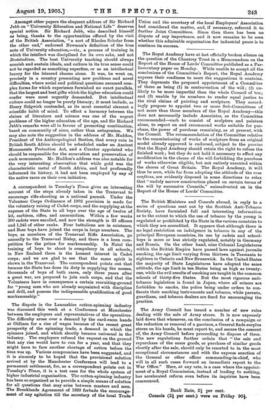Amongst other papers the eloquent address of Sir Richard Jebb
on "University Education and National Life" deserves special notice. Sir Richard Jebb, who described himself as being, thanks to the opportunities offered by the visit of the British Association, "a sort of Rhodes Scholar from the other end," endorsed Newman's definition of the true note of University education,—viz., a process of training in which the intellect was disciplined for its own sake, and not Brotstudium. The best University teaching should always nourish and sustain ideals, and culture in its true sense could not be regarded as something superfine, or as an intellectual luxury for the leisured classes alone. It was, he went on, precisely in a country presenting new problems and novel difficulties, where social and political questions assumed com- plex forms for which experience furnished no exact parallels, that the largest and best gifts which the higher education could confer were most urgently demanded. But intellectual culture could no longer be purely literary; it must include, as Henry Sidgwick contended, as its most essential element a scientific habit of mind. To effect a harmony between the claims of literature and science was one of the urgent problems of the higher education of the age, and Sir Richard Jebb's remarks were all in favour of promoting combination, based on community of aims, rather than antagonism. We may also note the suggestion in the address of Mr. Haddon, President of the Anthropological Section, that every ruin in British South Africa should be scheduled under an Ancient Monuments Protection Act, and a Curator appointed who should be responsible for the excavation and preservation of such monuments. Mr. Haddon's address was also notable for the very interesting observation that. while gold was the characteristic metal of South Africa, and had profoundly influenced its history, it had not been employed by any of the native races on their own initiative.


































 Previous page
Previous page